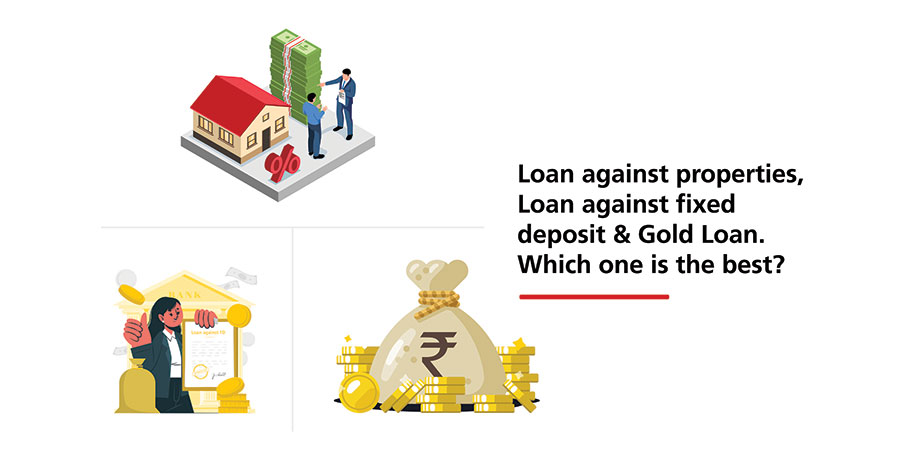It is not uncommon for people to come across situations where there is a sudden need for extra funds. In such cases, secured and unsecured loans are two primary solutions that can compensate for financial deficits, and of these two, secured loans are undoubtedly easier to obtain if a person has collateral that can be used to secure the required amount.
For any individual who plans to avail of a secured loan to meet their financial needs, it is important that they are aware of what the various types of loans may entail. Today, the most popular secured loans that people opt for include loans against property, against FDs, and the gold loan.
Understanding the 3 Popular Types of Secured Loans
- Loan Against FD
FDs or fixed deposits are accounts where an individual deposits a lump sum for an agreed period of time at the bank for generating interest on that amount. In financial emergencies, instead of breaking the FD, a person can also use it as collateral for availing a loan. - Loan Against Property
Loans against property are secured loans where individuals can mortgage a property that they own to avail the loan. The property, which can be both residential as well as commercial, remains mortgaged with the lender till the time the loan is repaid. - Loan against Gold
For this type of loan, individuals are required to pledge gold ornaments, jewellery, etc. as collateral to avail the funds they need. The gold is submitted to the lender for the duration of the loan tenure.
One should be aware of the differences like the interest, maximum loan amount, eligibility, etc. of loans against property, loans against FD, and gold loans to make an informed choice among the three.
Suggested Read: How to use your Gold as collateral for your Dream Home
Key Features of the Loans
Loan against Fixed Deposit
- The maximum amount that an individual can avail as a loan depends on how much they have invested in the FD. Depending on the lender, the loan-to-value for a loan against an FD can be anything up to 90%.
- As compared to unsecured loans, the interest rate for a loan against an FD is much lower. Generally, the interest charged is 1-2% higher than the interest rate offered on the FD.
- Borrowers can choose loan tenures of up to 5 years. However, the repayment must be completed before the maturity date of the FD.
- There are no tax benefits to be availed for the interest of EMI payments for a loan against an FD.
Loan against Property
- Only property that is owned by the borrower individually or jointly can be mortgaged to avail a loan. Further, there must not be any other property loan running against the property in question.
- The maximum loan amount that can be availed depends on the current market value of the property. Generally, lenders allow people to apply for an amount of up to 80% of their property’s value.
- People can choose loan tenures of up to 20-30 years (depending on the lender) to repay this type of loan.
- Borrowers may also be eligible for certain tax benefits, depending on the end use of the funds that are availed under this type of loan.
Loan against Gold
- Only gold items with 22 karat purity or more can be pledged. In the case of jewellery, any gems or ornamentation on the gold is not taken into account at the time of valuation.
- The maximum amount that can be availed as a loan depends on the current value of the gold being pledged. Depending on the lender, the borrower may avail up to 75% of the value of the gold as a loan.
- Tenures vary significantly for gold loans, where people can choose a repayment period of a few months or years.
- There are also several repayment options available. For example, an individual can choose to repay the loan in a single lump sum payment at the end of the tenure or they can choose to repay the loan through monthly interest payments.
The Interest Rates
The rate of interest being offered for a loan is one of the most crucial aspects taken into account when it comes to choosing a particular loan. The interest rate is calculated based on several factors, including the collateral, the loan amount, tenure, credit score (only for loans against property), etc. Loans against property and gold loans have competitive interest rates, which may vary from lender to lender. For a loan against property, the interest rate may vary from 9-15% and from 9-25% for a gold loan. A loan against FD attracts the lowest rate and may vary from 5-10%. One can opt for fixed or floating interest rates for a loan against property, while the other two only have fixed rates. One can use an online loan calculator to get a better idea of how much each loan will cost them in the long run.
Eligibility Criteria
Both gold loans and loans against FD have easy eligibility criteria, where the applicant must be an adult citizen of India, as the loan mainly depends on the value of the collateral. Loans against property, on the other hand, have much more stringent eligibility requirements. They may vary from lender to lender but generally include the applicant’s age, income, employment stability, credit score, existing debt, property value, etc.
Documentation
Gold loans and loans against FDs require minimal documentation and have easy application processes. For a loan against property, the documentation required may include proofs of identity, address, income, tax return filing, etc.
A Comparison of the Pros and Cons
Each type of loan has its own set of benefits and risks and is suitable for particular requirements.
- Loan against Property: You can get a higher loan amount and longer tenure for loan repayment. However, one needs to be extremely careful and diligent with the monthly interest payment as a property is a major asset and non-repayment can lead to one losing their property.
- Loan against FD: Comes with lower interest rates but the amount that can be availed as a loan is limited by the amount in the FD and the loan also has shorter repayment tenures. Defaulting the repayments can lead to losing the FD and will also impact the borrower’s credit score.
- Loan against Gold: Offers the easiest eligibility, flexible repayment options, and a range of tenure options. However, the loan amount is limited to up to 75% of the value of the gold pledged. Defaults on repayment lead to the borrower losing the pledged gold, but does not impact their credit score. But for a gold loan, you have minimum due payments to support the client. When facing financial difficulties and are unable to make their essential payments, an option known as the minimum due option may be presented. Customers can keep their loan accounts open by making modest installments with this option. The payment will contain a small fraction of the main amount as well as a portion of the interest, ensuring that they are making some effort toward meeting their commitments.
Choosing which loan is best for a particular situation depends on how much money a person requires, their eligibility for the loan, their repayment capability, the assets they own, the value of their assets, etc. One should put in due research and use an online loan calculatoras well to consider all aspects of these loans before making their decision.

 Usage of Mask
Usage of Mask
 Temperature
Temperature
 Sanitization Of
Sanitization Of

















Leave a Comment